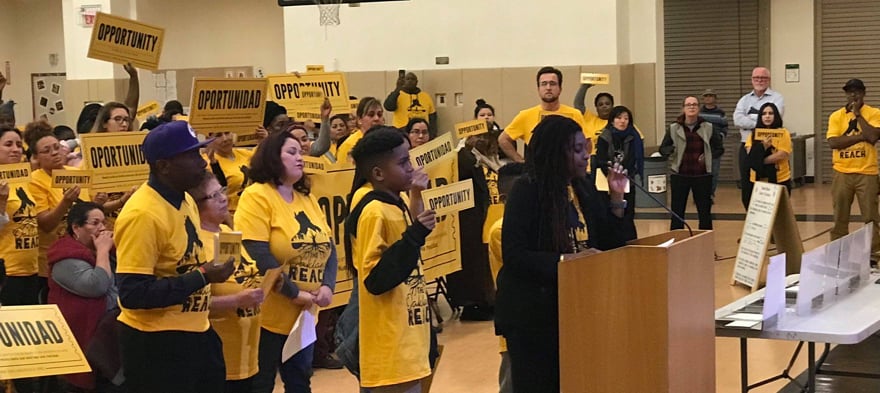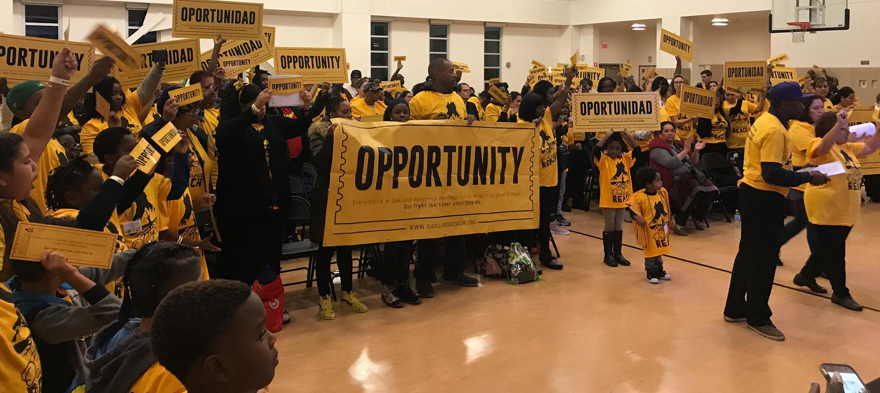
Lakisha Young is the executive director of The Oakland REACH. Her work began through witnessing the disparities faced by Black and Brown students, including members of her own family. She sought to change the trajectory of public education for her three children and communities of color in Oakland by engaging and leading families in a charge to advocate for fair and equitable practices that would give them access to and enhance opportunities for academic success.
To date, The Oakland REACH has met with over 3,000 parents in Oakland with the goal of, “Empowering parents from our most underserved communities to demand better schools for our kids.” They continue to push these efforts through their latest endeavor of joining with other community partners, leaders and advocates to build a coalition to combat the issue of literacy proficiency.
How did you get involved in educational advocacy and activism?
My mom was a single mother and made education a priority for me because she knew that was essential for college, a good career and a brighter future. Her brilliance opened pathways for me that would not have otherwise been there. And I figured once I became a mom, providing a quality education for my daughter would be easy. And then it wasn’t.
I was shocked and scared. [pullquote]I had to fight hard to get my daughter into a good school, and honestly, I don’t want other parents to go through that hardship[/pullquote], or worse, not know their kids are in failing schools where they aren’t learning to read. That’s the fire in my belly that keeps me going every day.
You, and other leaders, have formed a coalition to address various issues impacting the quality of education for Black and Brown families. Why did you choose reading proficiency as a starting point?
At The Oakland REACH, our work comes from our families. And again and again, we were hearing that the thing that keeps parents up at night is their child’s ability to read. [pullquote]They know that if they do not make sure their children can read, there is a potential prison bunk waiting for them.[/pullquote] That’s what makes this campaign unique: it is led by the parents most impacted by failing schools—they are finally the forethought, not an afterthought. Our parents chose Literacy for All.
Given the newly released data in The Secret Shame: How America's Most Progressive Cities Betray Their Commitment to Educational Opportunity for All, are you surprised to learn progressive cities—including Oakland—are lagging behind in closing opportunity gaps for Black and Latino students?
Not surprised at all—this is a citywide crisis and it’s been going on for generations. That’s why our campaign goes beyond focusing on K-3 literacy outcomes, and targets increasing the literacy of the whole family—including the mamas and grandmamas. We have grandparents in The Oakland REACH who graduated from Oakland public schools not knowing how to read. Then it happened to their kids. They’ll be damned if they’ll let it happen to their grandkids now, too.
What needs to be done to close these gaps?
We are pushing the city on a message of Literacy for ALL. We know that if we are going to solve this crisis in a sustainable way, we must uplift and heal the whole family around failed education outcomes.

What do you hope Literacy for ALL will accomplish?
This campaign focuses on two key goals:
In January, we launched a petition for our campaign goals hoping for 500 signatures in a month—and within just three weeks, we were over 1,200 signatures from parents, teachers and community members. There is demand for this movement.
Readers can check out our petition and sign it here.
How do you plan to empower underserved communities locally and nationally to join the coalition's efforts and advocate for their educational needs?
Our northstar is empowering families to serve as informed partners and advocates for children. That’s why our campaign started with a Summer Literacy Series for parents in partnership with the Oakland Literacy Coalition. Our parents didn’t know how their children were doing—or if they were on grade level in reading. This series was a chance to participate in a reading assessment conducted by a public school teacher and get grade-level books for their kids. Our goal was to sign up 100 parents, and we well exceeded that goal. It was at that moment we knew our parents care deeply about literacy, and they’ll show up for this work.
Since then, we have launched a parent learning series that will educate parents on everything from the science of reading to how literacy impacts students with special needs and how to advocate for better partnership and within their schools. We have also established three councils for systems leaders, parents, and educators (teachers & principals), who meet separately and collaboratively in whole group meetings. This is a full team effort.
Tanesha Peeples is driven by one question in her work—“If not me, then who?” As the former Deputy Director of Activist Development for brightbeam, Tanesha merges the worlds of communications and grassroots activism to push for change in the public education system. Her passion for community and relentless mission for justice and liberation drive her in uplifting and amplifying the voices and advocacy of those that are often ignored. Tanesha wholeheartedly believes that education is the foundation for success. Her grand vision is one where everyone—regardless of ethnicity, socioeconomic status, gender or ZIP code—can have access to a comfortable quality of life and enjoy the freedoms and liberties promised to all Americans. And that's what she works towards every day.
If you have a child with disabilities, you’re not alone: According to the latest data, over 7 million American schoolchildren — 14% of all students ages 3-21 — are classified as eligible for special...
The fight for educational equity has never been just about schools. The real North Star for this work is providing opportunities for each child to thrive into adulthood. This means that our advocacy...
The story you tell yourself about your own math ability tends to become true. This isn’t some Oprah aphorism about attracting what you want from the universe. Well, I guess it kind of is, but...
Your donations support the voices who challenge decision makers to provide the learning opportunities all children need to thrive.
Ed Post is the flagship website platform of brightbeam, a 501(c3) network of education activists and influencers demanding a better education and a brighter future for every child.
© 2020–2024 brightbeam. All rights reserved.